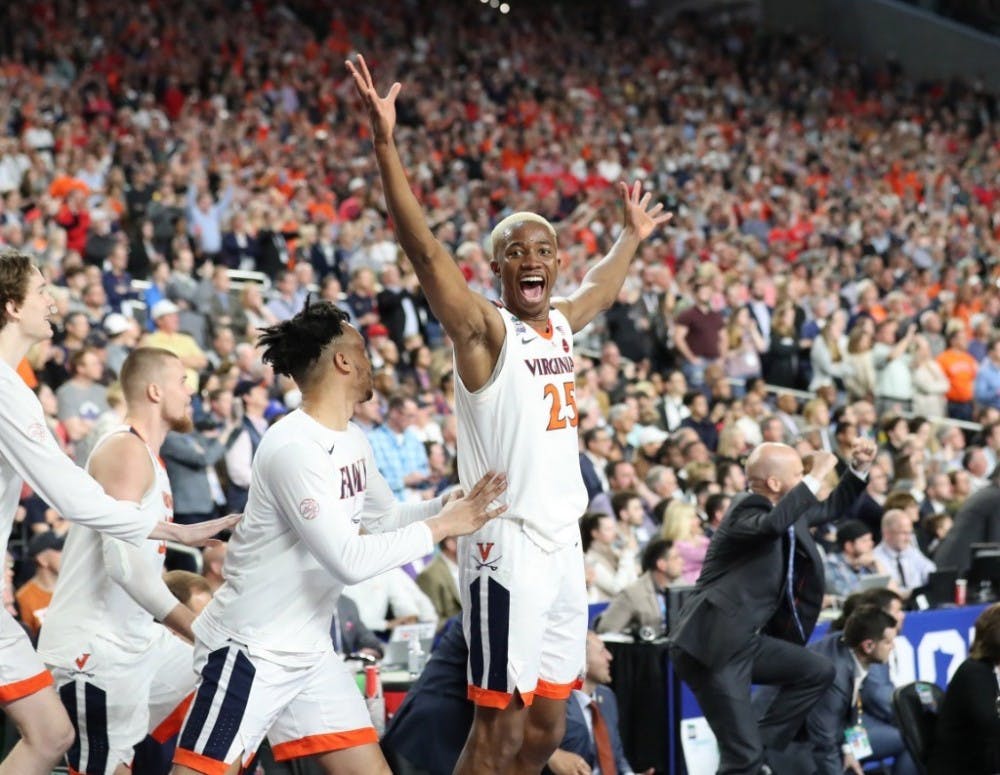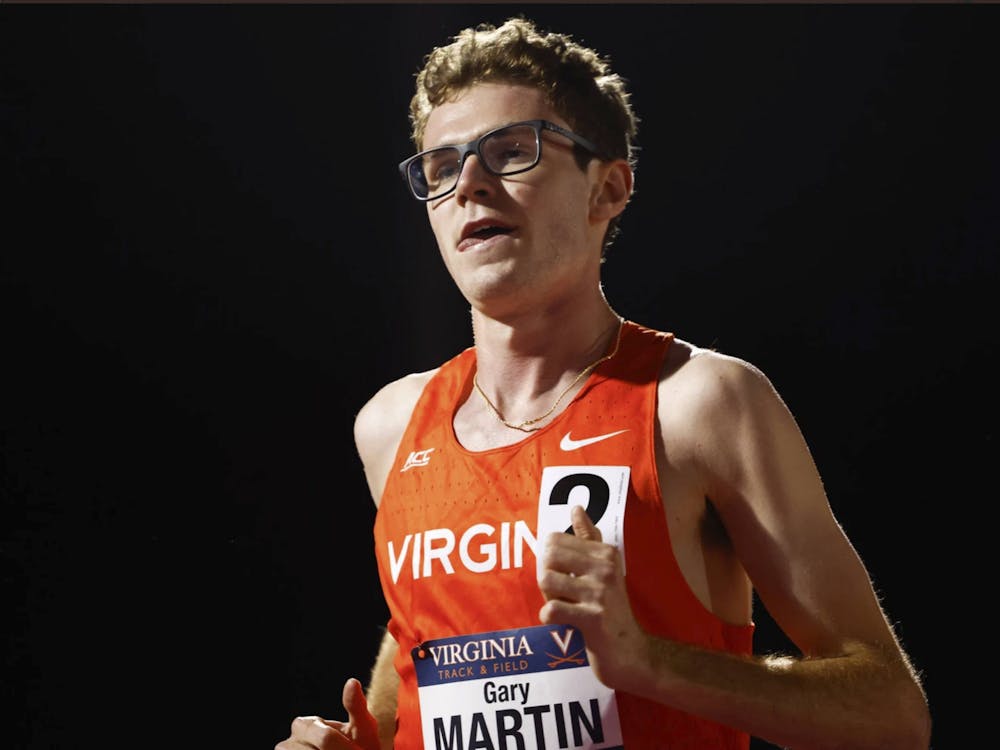In a memorable comeback story, Virginia men’s basketball finished the 2018-19 season in historic fashion with the program’s first-ever national championship. However, this year’s Virginia squad will look and play a lot differently from the team that beat Texas Tech in the national title game just six months ago.
Half of Virginia’s championship-winning rotation — former guards Kyle Guy, De’Andre Hunter and Ty Jerome and center Jack Salt — is now playing professional basketball. However, several strong returners, combined with promising recruits and the leadership of Coach Tony Bennett, means the 11th-ranked Cavaliers are once again poised to compete at the national level.
With the season opener approaching, let’s meet the new-look Cavaliers.
Projected starting lineup
Virginia lost three of five starters from last season’s NCAA Tournament run, including the backcourt pairing of Guy and Jerome. However, the Cavaliers’ point guard — sophomore Kihei Clark — returns. Clark broke out last season, turning heads with his tenacious defense and high-energy style of play. Focused on facilitating the offense, Clark took a backseat to other offensive playmakers last year. He averaged just 4.5 points per game, and will need to play a bigger role this year as a creator and scorer.
Starting shooting guard will be the most highly-contested position in Virginia’s lineup. That said, four-star prospect and freshman guard Casey Morsell should eventually beat out other options to become Clark’s long-term backcourt partner. Morsell has high expectations as Bennett’s highest-ranked recruit — per ESPN — since Guy and Jerome joined the program in 2016. The Washington D.C. area native projects to be one of Virginia’s top scoring options this year. From driving to the basket with his athletic frame to sinking mid-range jumpers and three-pointers, Morsell can score from anywhere on the court and has everything it takes to be the next great Virginia guard.
Without Hunter on the wing, senior guard Braxton Key will need to step up as a contributor on both ends of the floor. Despite logging inconsistent minutes last year after transferring from Alabama, Key has all the tools to be a two-way impact player. He is already an excellent rebounder and defender and will look to be a solid scoring option for the Cavaliers.
Senior forward Mamadi Diakite — Virginia’s only returning frontcourt starter and 2019 Elite Eight hero — might just be the Cavaliers’ most important player this year. Prolific on defense and quickly improving on offense, Diakite will be the focal point of this Virginia team. Expect him to score significantly more than the 7.4 points per game he averaged last season as the Guinea native looks to prove that he’s an NBA-caliber player.
Bennett will round out his starting lineup with some size and offensive flair in junior forward Jay Huff. The 7-foot-1 fan favorite is a versatile, do-it-all big man — per 40 minutes, over the last two seasons, Huff averaged 18.9 points, 9.2 rebounds and 3.7 blocks. Huff will finally have the opportunity to showcase his talent this year as a consistent starter.
Other key players
Historically, Bennett has relied on a smaller seven- or eight-man rotation throughout the season. Accordingly, expect junior transfer guard Tomas Woldetensae and redshirt freshman center Francisco Caffaro to earn substantial playing time and add critical depth. Woldetensae — a first-team junior college All-American last year — adds craftiness and solid outside shooting on offense and Caffaro — a seven-footer from Argentina — provides a physical presence down low akin to what Salt did during his time at Virginia.
Sophomore guard Kody Stattmann will also compete with Morsell and Woldetensae for playing time and could potentially start for Virginia. The 6-foot-7 Australian can cause opponents problems on both ends of the court with a smooth shooting stroke and lengthy frame. Freshman forward Justin McKoy may get some minutes as well, while freshman forward Kadin Shedrick is expected to redshirt.
X-Factors
Three-point shooting
Last season, Virginia relied on three-point shooting heavily. The Cavaliers averaged the third-highest three-point field goal percentage — 39.5 percent — of all NCAA Tournament teams and nearly one-third of their total field goals made were three-pointers.
However, this season, the Cavaliers need to fill the void created by the departure of Virginia’s most prolific deep shooters — Guy, Hunter and Jerome. Scouting on Woldetensae and Morsell says they are both able to shoot the ball from three-point range, but Clark, Diakite and Key — all of whom shot below 35 percent from deep last year — will have to be better. Virginia teams under Bennett often live and die by the three. The Cavaliers could be doing more of the latter this season if the team, as a whole, isn’t accurate from beyond the arc. Otherwise, Virginia may have to find new ways to score, such as a strong frontcourt.
Backcourt depth
In Virginia’s offense, guards are critical — they are responsible for controlling the tempo and the game. However, Virginia’s backcourt is thin this year. Clark is the Cavaliers’ only guard with playing experience, and Woldetensae and Morsell are the only other two ball-handling guards set to receive significant playing time. Virginia will need all three to contribute as facilitators and scorers.
Key storylines
How will Virginia replace the scoring of Guy, Hunter and Jerome?
The Virginia offense averaged just over 71 points per game last season. Of that figure, the “Big Three” contributed 44.2 points per game — over half of the total offense. Where will the Cavaliers find all that production? Long story short — the scoring must come from multiple places.
Unlike other teams in the country, Virginia can’t just replace NBA-level players with more NBA-level players year-after-year. Accordingly, multiple Cavaliers — both in the paint and on the perimeter — have to step up, even if it just means scoring a couple more buckets every game. Specifically, Diakite, Huff, Key and Morsell have the potential to be double-digit scorers this year, so look for them to power the Cavaliers’ offense.
Can the inexperienced Cavaliers make an impact immediately?
Virginia’s roster turnover this year isn’t just rare — it is unprecedented in the Bennett era. In fact, the program hasn’t lost four of its top seven players in total minutes from the previous year since 2005. As a consequence of losing so many key contributors, Virginia will have to rely heavily on newcomers to the rotation.
The risk of giving heavy minutes to Morsell and Woldetensae in the backcourt, and Caffaro and McKoy in the frontcourt is that they are all, as of yet, unproven at the Division I level. Virginia can traditionally count on experienced upperclassmen who have spent years developing under Bennett. This year will be different — the Cavaliers need several players who have never played a minute for Virginia to look like seasoned veterans. Whether they are up to the task or not will decide how far the team can go this season.
Bottom line
On paper, this year’s Virginia’s squad is not as talented as last year’s group or other national powerhouses. However, the Cavaliers are used to beating teams with more starpower than them. Bennett’s system — the mover-blocker offense and the stingy pack-line defense — is built to overcome individual weaknesses and maximize team efficiency. As long as Bennett is at the helm and has players who buy into his playing style, Virginia will always compete at a high level.
The Cavaliers begin their national championship defense Wednesday, Nov. 6 with a conference battle at Syracuse.







